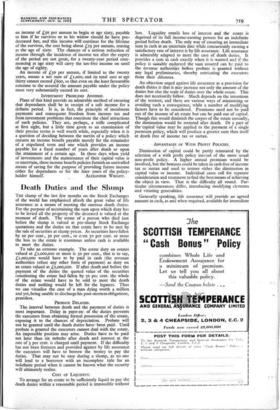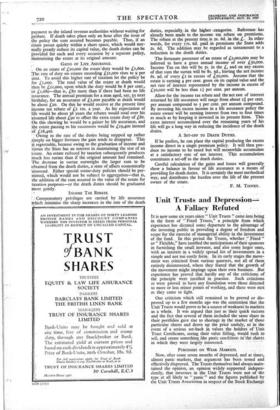Death Duties and the Slump THE slump of the last
few months on the Stock Exchanges of the world has emphasised afresh the great value of life assurance as a means of meeting the onerous death duties. For the purpose of ascertaining the sum upon which duty has to be levied all the property of the deceased is valued at the moment of death. The estate of a person who died just before the slump is valued at pre-slump Stock Exchange quotations and the duties on that estate have to be met by the sale of securities at slump prices. As securities have fallen by 20 per cent., 3o per cent., or e--en 50 per cent. or more the loss to the estate is enormous unless cash is available to meet the duties.
To take an extreme example. The estate duty on estates valued at £2,000,000 or more is 5o per cent., that is to say, LI,000,000 would have to be paid in cash (the revenue authorities refuse any other form of payment) as duty on an estate valued at £2,000,000. If after death and before the payment of the duties the quoted value of the securities constituting the estate had fallen by 5o per cent. the whole of the estate would have to be sold to meet the death duties and nothing would be left for the legatees. Thus we can visualise the case of a man dying worth a million and yet, being unable to discharge his post-mortem obligations, penniless.
PROBATE DELAYED.
The interval between death and the payment of duties is most important. Delay in paw en. of the duties prevents the executors from obtaining formal possession of the estate, exposing it to the chances of depreciation. Probate will not be granted until the death duties have been paid. Until probate is granted the executors cannot deal with the estate. An impossible position may arise. Duties- have to be paid not later than six months after death and interest at the rate of 3 per cent. is charged until payment. If the difficulty has not been foreseen and provided against by life assurance the executors will have to borrow the money to pay the duties. That may not be easy during a slump, as no one will lend to a borrower with an incomplete title for an indefinite period when it cannot be known what the security will ultimately realise.
COST OF LIQUIDITY.
To arrange for an estate to be sufficiently liquid to pay the death duties within a reasonable period is impossible without loss. Liquidity entails loss of interest and the estate is deprived of its full income-earning powers for an indefinite period before death. The only way of ensuring an immediate sum in cash at an Uncertain date while concurrently earning a satisfactory rate of interest is by life assurance. Life assurance is admirably adapted to meet the case of death duties. It provides a sum in cash exactly when it is wanted and if the policy is suitably endorsed the sum assured can be paid to the revenue authorities beffire probate is granted without any legal preliminaries, thereby extricating the executors from their dilemma.
An objection urged against life assurance as a provision for death duties is that it may increase not only the amount of the duties but also the scale of duties over the whole estate. This does not necessarily follow. Much depends on the intentions of the testator; and there are various ways of minimising or avoiding such a consequence, while a number of modifying factors have to be considered. Premiums need not be paid out of the income of an estate but can be paid out of capital. Though this would diminish the corpus of the estate annually, the diminution would be restored after death. Or a part of the capital' value may' be applied to the payment of a single premium policy, which will produce a greater sum than itself at death free of income tax or surtax.
ADVANTAGES OF WITH PROFIT POLICIES.
Diminution of capital could be partly reinstated by the selection of a with profit policy instead of the more usual non-profit policy. A higher annual premium would be involved, but the bonuses could be taken in cash free of income tax or surtax and used to restore either the diminution in capital value or income. Individual cases call for separate consideration and treatment to find the best means of achieving the object in view. That is the difficulty all round. Par- ticular circumstances differ, introducing modifying elements and vitiating generalities.
Generally speaking, life assurance will provide an agreed amount in cash, as and when required, available for immediate payment to the inland revenue authorities without waiting for probate. If death takes place only an hour after the issue of the policy the sum assured becomes payable. Thus, if an es- - tate passes quicky within a short space, which would nor- Mally greatly reduce its capital value, the death duties can be provided for each and every occasion by a separate policy, maintaining the estate at its original amount.
GAINS OF LIFE ASSURANCE.
On an estate of £20,000 the estate duty would be £1,600. The rate of duty on estates exceeding £21,000 rises to 9 per Cent. To avoid this higher rate of taxation let the policy be for £i,000. The total value of the estate at death would then be £21,000, upon which the duty would be 8 per cent., or £1,680—that is, £80 more than if there had been no life 'assurance. The annual premium for a man aged, say, 35 next birthday, for an assurance of £1,00o payable at death would be about £20. On this he would receive at the present time income tax rebate of £2 los. a year. As his expectation of life would be about 36 years the rebates would total over his 'assumed life about £90 to offset the extra estate duty of £80. On this showing he would be a gainer by life assurance, and the estate passing to his successors would be £19,400 instead Of £18,400.
Owing to the rate of the duties being stepped up rather .steeply on bigger fortunes the gain tends to disappear. This is regrettable, because owing to the graduation of income and surtax the State has an interest in maintaining the size of an estate. An estate reduced by taxation subsequently produces Much less surtax than if the original amount had remained. The decrease in surtax outweighs the larger sum to be 'obtained from the death duties, a state of affairs economically unsound. Either special estate-duty policies should be per- thitted, which would not be subject to aggregation—that is, the addition of the sum assured to the value of the estate for taxation purposes—or the death duties should be graduated More gently.
INCOME TAX REBATE.
: - Compensatory privileges are carried by life assurance Which minimise the sharp increases in the rate of the death duties, especially. in the higher categories. Reference- has already been made to the income tax rebate on premiums. The rebate at the presenttime,is 2S. 6d. in the.£. In other words, for every 17s. 6d. paid in premiums the State. adds 2s. 6d. The addition may be regarded as tantamount to a reduction in the death duties.
The fortunate possessor of an estate of £2,000,000 may be inferred to have a gross annual income of over £50,000. Income Tax on this will be 5s. in the L, and on any excess of that sum the surtax will be 8s. 3d., leaving the net income 6s. 9d. of every Et in excess of £50,000. Assume that the estate is earning 4 per cent. gross on its capital value and the net rate of interest represented by the income in excess of £50,000 will be less than I :1 per cent. per annum.
Allow for the income tax rebate and the net rate of interest returned by life assurance will range from about 22 per cent. per annum compound to 5 per cent. per annum compound. By investing his excess income in a life assurance policy the estate owner will be earning interest from two to four times as much as by keeping it invested in its present form. This extra interest accumulated over the remaining years of his life will go a long way in reducing the incidence of the death duties.
A SET-OFF TO DEATH DUTIES.
If he prefers, he can place the capital producing the excess income direct in a single premium policy. It will then pro- duce no income to be taxed but will meanwhile accumulate at a satisfactory rate of net interest. This accumulation constitutes a set-off to the death duties.
Careful calculation of the gains and losses will generally show a balance in favour of life assurance as a means of providing for death duties. It is certainly the most methodical way, and distributes the burden over the life of the present owner of the estate.
F. M. TOOVEY.































































 Previous page
Previous page